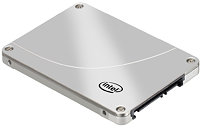Friday, July 15th 2011

Intel Acknowledges SSD 320 Series ''8 MB Bug''
Intel's 320 Series SSD is the silicon giant's big push of SSD technology into homes and offices. The SATA 3 Gb/s compatible 2.5" SSDs offer generally good price per gigabyte by SSD standards, and is even backed by a 5 year warranty after some customers were skeptical about the low NAND flash rewrite cycle capacity of the new 25 nm MLC NAND flash chips. Off late, several customers have been noting a bug in its firmware that drops capacity down to 8 MB, making data occupied on the rest of the capacity inaccessible. This bug came to be popularly known as the "8 MB bug".
Intel's Support Community boards have been piling up with complaints about this bug by users of 320 series. Then earlier this week, Intel's Non-Volatile Memory (NVM) Solutions Group acknowledged this bug. It asked customers to contactIntel representatives or Intel customer support, and said that it will provide an update when it has more information. In all likelihood, this is yet another case of buggy firmware by Intel, which haunted it through the 34 nm X25-M and some older SSDs.
Source:
TechSpot
Intel's Support Community boards have been piling up with complaints about this bug by users of 320 series. Then earlier this week, Intel's Non-Volatile Memory (NVM) Solutions Group acknowledged this bug. It asked customers to contactIntel representatives or Intel customer support, and said that it will provide an update when it has more information. In all likelihood, this is yet another case of buggy firmware by Intel, which haunted it through the 34 nm X25-M and some older SSDs.

32 Comments on Intel Acknowledges SSD 320 Series ''8 MB Bug''
And, more to the point, it's * precisely* why I refuse to buy OCZ drives. They denied Vertex 3/Agility 3 bugs after other companies were fixing the same issues in firmware. It took them until June to make a firmware update and even then it didn't fix it. They've had 4 firmware releases in the last month and they still can't get it right.
I'm just going to hope this "8MB bug" doesn't show up in my SSD 320 120GB before a firmware update comes.
Also, Apple stepped up to the plate with the nVidia GPU failure issue. They covered Macbook Pros for failed GeForce 8600M GT failures longer than HP, Dell, or anyone else did - an extra 2 years, so if you bought Apple Care, you got 5 years of free replacement for that particular bug.
Better that you buy a possible bugged Intel drive than crap a OCZ drive. OCZ deletes your posts/threads on their forum to cover their asses. Its WHEN, and NOT IF, your OCZ SSD goes on the fritz...
I've had the Vertex 1 and 2 drives. Both of them were problematic at best.
communities.intel.com/thread/22227?start=60&tstart=0
This is far from a perfect industry and mistakes happen. Owning up to those mistakes is part of the business.
The only thing that could cause condemnation would be if they had not owned up, or made excuses for their mistake.
And that is why it is perfectly acceptable to condemn Apple.
***
10/10 for Intel manning up to this. But that doesnt help the person who (ma) have lost important data AND will suffer remedy time and expense
***
SSD's are getting faster, but also more problematic. This isnt good. Following Moores law, I would rather have a 120GB SSD for $50 at the "original SSD speeds but with 100% reliability" that 120GB for $600 at "new ultra 1000000MB/s speeds but with 50% reliability". THE CONSUMER IS NOT GETTING the benefit of Moores law IMO
at least they don't make faulty CPU's* :D
*) and should they have any nested bugs Intel have enough cohones to tell us about it :toast:
Link
People are over reacting, I highly doubt this is a major issue.
At the end of the day there is a chance for and drive to fail and back ups are important.
An SSD failing due to hardware aging is normal and acceptable and at the end of the day, unavoidable.
An SSD failing due to crappy firmware is not. :slap:
At the end of the day a user should not have to face such problem because Intel is fucked up with their software department.
Back up or not have nothing to do with this.
When you buy a product from a company like Intel you expect such product is properly tested for avoidable problems like this.
Google is your friend if you don't believe me.
2) You would have to be ignorant to think that this is the only ssd with some sort of firmware issue.Got any evidence to support those claims? You seem to be jumping to conclusions there.